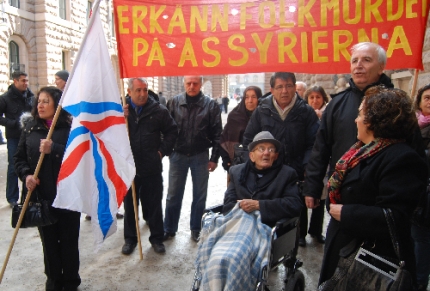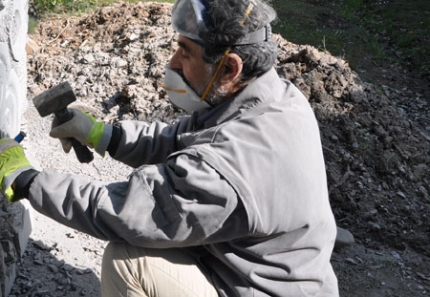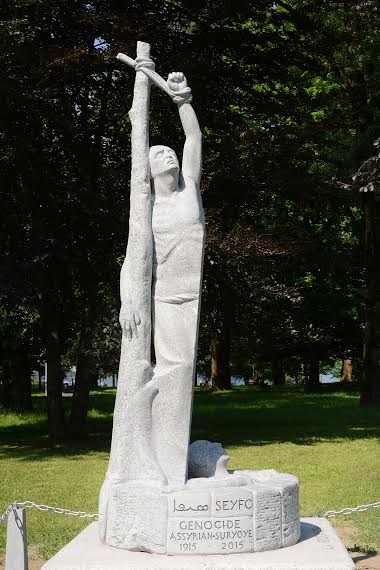My name is Zalgai Aho. Some of you may know my father, Rabi Ninos Aho. Like many of you, I grew up in a very patriotic home. On February 5th, we would visit Naum Faik’s gravesite. On August 7th, we would light a candle for our fallen heroes and speak about the genocides that have plagued our nation. These heroes were everyday Assyrians who refused to give up their language, religion and nationality, and for that, they paid the ultimate price. On this day that we remember those who paved the way for us to even be here today, I want to share with you things I believe are vital to our nation’s survival.
Imagine if, starting today, we all stopped speaking Assyrian and spoke to each other only in the language of our host countries: English, Arabic, Swedish, and so on. I guarantee you that within 2 or 3 short generations, our language will be lost. And if that happens, it is a very short road to losing our very identity. This generation has to continue speaking our language, not just with our families, but also with our peers. Make an effort every day to integrate our language into your daily lives. When you’re out with friends, speak more Assyrian than English. Those of you who have young children at home, teach them Assyrian, and make sure they speak it as much as possible, so that when they grow up and have children of their own, they will teach them the same. Make it a habit so that it becomes something natural.
Now speaking of language, there’s another point I’d like to make, and that is the fact that too many times, we as Assyrians cannot even communicate with each other. For example, I speak Suryoyo. Most of you here tonight speak Madenkhaya/Suret. I truly feel sadness and frustration when I go to our events and I can only understand roughly half of that people are saying. Or when I have to tell someone “I don’t speak this dialect of Assyrian, I speak the other one”, then we all have to resort to English to communicate. I think it’s a shame, and I believe that we should all make an effort to learn both dialects. It is something that with a little bit of work and time, can be done. I personally have set a goal for myself to be able to speak Eastern Assyrian in one year’s time. So by this time next year, I hope to be speaking to you in Madenkhaya/Suret, and I hope you will be able to speak to me in Suryoyo. I urge everyone to learn both dialects; slowly but surely we will all be able to communicate with each other and that will be one less roadblock in our way.
2) Awareness: By that I mean, make others aware of who the Assyrians are. This can be as simple as, when someone asks you what you are, say you are Assyrian! Don’t take the easy way out and say Arab, Persian, Middle Eastern, and so on. Take 5 minutes out of your day to educate them. I can’t count the number of times I’ve told random strangers about where I’m from and who the Assyrians are. Usually the conversation goes something like this:
“I’m Assyrian.”
“Oh, you’re Syrian!”
“No, not Syrian, Assyrian. We are the indigenous people of the Middle East before it was Arabic.”
“Oooh…”
And some people will get it, some people won’t. But I feel it is our duty and the very least we can do to help our nation survive. By explaining who you are, you may have just made the difference in that person going home and Googling Assyrians, and learning more about us. A lot of times people tell me, “Oh, I thought you guys didn’t exist anymore!” -– people think our nation is EXTINCT. That is so unfortunate, and it is no one’s fault but our own. It is up to us to make sure that they know we are very much alive and kicking!
3) Unity: One of the largest problems we face as a nation is our lack of it. For as long as I can remember, I’ve been hearing the same conversation: “This group doesn’t believe they’re Assyrian, they think they’re something else." “That group goes to a different church, they’re not as Assyrian as we are.”
This must stop.
I grew up in a home where both my parents taught us that all Assyrians are one; Eastern, Western, Chaldean, Aramean, Catholic, Orthodox, no matter which country you were from: We are all one!! There was no question about it, it was just a way of life for us. If we ever expect to gain recognition from the Western world and have our own homeland, we must present a united front. Think of how far other groups have been able to get by being united; the Jews in securing a country, the Armenians in having the world recognize their genocide. We can do the same, if we just put aside our differences and come together to work for common goals. The older generations need to start mending their ways, and the younger generations should avoid this way of thinking all together, so that we can unite as one people & one nation, under one flag, and move ourselves forward.
George Farag, in his song called “Abri”, which means “My Son” in Suryoyo, described the genocides. I’d like to read you a part of that very moving song, translated into English:
“My son, you have a land that you should not forget. You should water her with your tears, it’s been years that history has been talking about her; this nation was the bride of time. My son, don’t forget her.
And a day came when the flame of her candle went out, and her sky darkened, and a foreign hand started to kill her sons. Blood flooded her homes, her children were thrown against the walls and their blood started to mix with her soil.
You see a mother dyed with blood, and she runs with her son against her shoulder while she asks about her daughter. She fell to the ground and kissed her son, and with that kiss she swallowed her tears, and she knew that then and there, her life would end. And before she died, she wailed "Aaakh!" and hugged her son.
From Safar Barlik to Simele, how many swords have passed over this land! They killed mothers and children, and not once did they have mercy on our nation. Homes burnt while smoke reached to her skies. You see a child crying and searching for his mother, while a baby lays next to his mother; she is gone, but still he suckles from her breast.
If bad times are to befall your nation my son, do not abandon her. And give her your word that you will fill her with nationalistic sons & daughters. Disregard any nation that wants to annihilate you! Stand before them like a lion, and don’t bow down to anyone but God.
My son… don’t forget your land.”
Remember, it is important to honor our martyrs; every year on this day, Assyrians around the world come together to commemorate those who died before us. But it is not enough. Let us live and lead by example. Uw Seyfo, the genocide, did not differentiate between us; the Ottomans did not spare those of us who called ourselves by a different name, or who spoke a different dialect, or who went to a different church. To them, we were all Assyrians, and they killed us all as Christian Assyrians. If we truly want to honor them, we must put aside our so-called differences, and unite under one flag, one name and one nation; so that the hundreds of thousands of lives lost, will not be in vain.
Are you telling me that our ancestors who were starved to death, forced on death marches, and killed in the most brutal of ways, all died for nothing?? They refused to give up their identity, and they made the ultimate sacrifice so that our nation could live on. It is our duty to now take the necessary steps to make sure we move forward as one people, so that 100 years from now, 500 years from now, our children will still proudly say “We are Assyrian”, and people around the world will all know who we are.
Tawdi. Basima.



